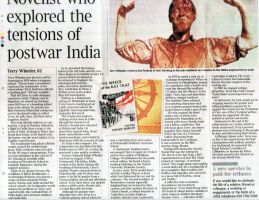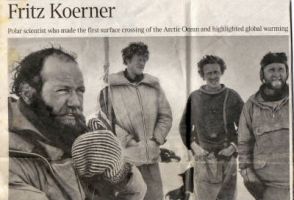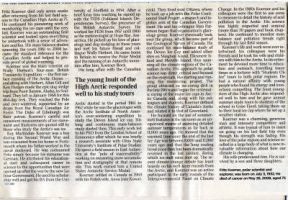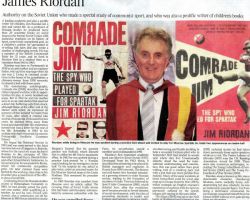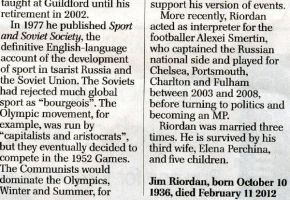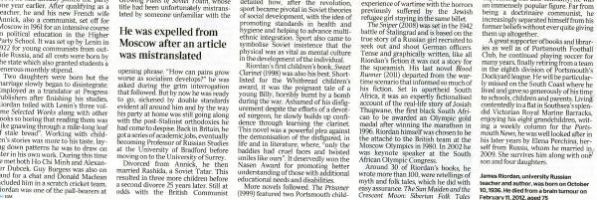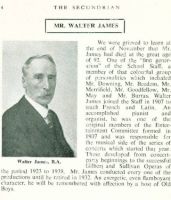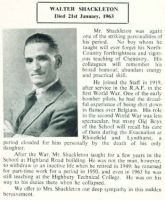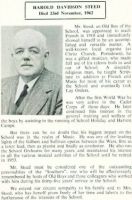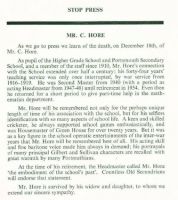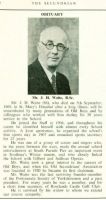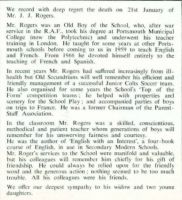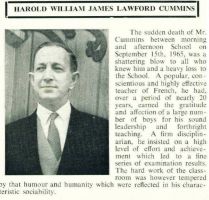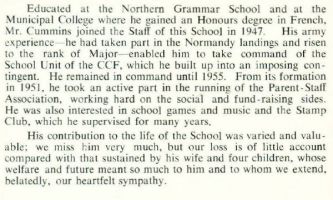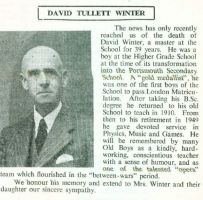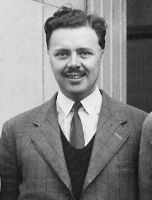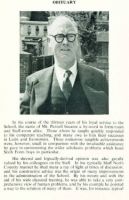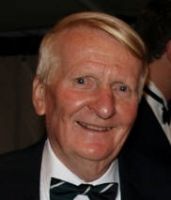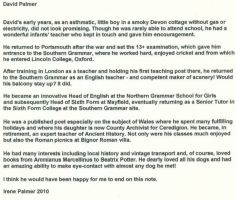Obituaries 2
Traditionally, the Association has marked the passing of Old Secundrians by remembering them at the annual dinner. The Association's Committee decided in 2011 that a more fitting and permanent tribute would be to record their passing on the annual dinner menu card and then to invite friends to lodge obituaries on the website. Accordingly, this page is given over to recording those tributes.
The Obituaries are shown on 2 pages. See also the Rolls of Honour pages for those who gave their lives in both World Wars; these include pages specifically given over to obituaries of all those who died in the Great War. (see Rolls of Honour ).
Colin Peters
Eulogy for Dr Colin George Peters
I was the fifth of the seven children of Dorothy and George Peters and was born in Portsmouth on 26 November 1932. It was the era of ‘Spare the rod and spoil the child’, or, as one visiting aunt once reminded me, ‘Little boys should be seen and not heard’. Discipline was firm.
The outbreak of war in 1939 brought abrupt changes to family life. Food was rationed, schools closed, and nightly air-raids—sometimes five times a night—robbed people of sleep. We children scoured the streets collecting shrapnel. Soon, three of us—myself at 7, Bernard 9, and Scott 12—were evacuated to Thruxton, near Andover, where we watched the Battle of Britain unfold in the skies. After about a year, we returned to the family home, now at 93 Warren Avenue, Milton.
Aged 8, it was time for piano lessons—a family custom promoted by my mother and backed by my sister Diana, a fine exponent of the art. When she perceived improvement, she’d hand me her purse and let me take any copper coins I found. Before long, music had become the focus of my life.
At 11, I gained a place at Portsmouth Southern Grammar School, which had been relocated to Brockenhurst in the New Forest. I lived with 30 other boys in a requisitioned hotel until, after D-Day in June 1944, the school returned to temporary buildings in Southsea.
After seven years, I passed four A-Levels and was awarded a Portsmouth Major Scholarship. I continued music studies with Thomas Newboult, Organist at Portsmouth Cathedral, gaining prizes, Exhibitions and awards that mostly covered my lesson costs. In May 1949, aged 16, I gained an Exhibition to Trinity College of Music, with the highest Grade Eight Piano mark in the country—duly noted in the Portsmouth Evening News.
Still at school, I took the Concert Performer's Diploma of the Royal Academy of Music (LRAM), immediately prior to submitting myself—with great reluctance—to another entirely different kind of examination: a ‘medical’ test for entry to His Majesty’s Royal Army Pay Corps, as part of the two years’ National Service required of all young men after the war.
On 20 September 1951, I reported for training at Waller Barracks, Devizes, and within ten weeks was on a troopship to Egypt, where I spent the remainder of my two years’ service under canvas. Every Wednesday afternoon, I broadcast a fifteen-minute piano programme entitled Piano Playtime, which resulted in the appearance of an article in the Portsmouth Evening News—Piano is Sergeant’s Forte—complete with a photo of me in uniform, intended to promote, apparently, the value of National Service.
Those two years gave me lifelong friendships, and time to reflect on my future career. Ultimately, I decided to study English Literature—alongside music—thereby creating a two-pronged approach.
Returning to England in October 1953, I entered Nottingham University. Self-motivation did not come easily after two years of the non-thinking structures of a military existence—but I settled in. After graduating in English and taking a further music diploma, I transferred to the London University Institute of Education for a year of Teaching Studies. There, with countless other students, I explored theatres, galleries, concerts—and indulged in perpetual partying. In July 1957, I was awarded a Distinction in the Post-Graduate Certificate in Education.
In September 1954, I accepted a teaching post at Orange Hill Grammar. To boost my income, I taught evening classes in English to foreign students—where I eventually met a French student, Michelle Gaudry. We married in Paris in August 1960, then returned to London, where, on 13 December 1961, I was presented with a gorgeous baby girl, Madeleine. Three years later, we moved to East Grinstead in Sussex, where I became Head of English Studies at the local Grammar School. Soon afterwards, on 3 June 1964, a second happy event occurred: a beautiful baby boy—André Philippe.
By now I had spent ten years in school-teaching—all fulfilling, all personally demanding, but limited in scope for development. In September 1967, I became Lecturer in Music and Drama at Chelsea College of Education, a teacher training college in Eastbourne. Within a month, I was delighted to enrol for evening classes at Birkbeck College, London University, for a Master of Philosophy.
Four years later, when a Senior Lecturer post opened at Chichester University—close to my home roots—I couldn't resist. In October 1970, I left Eastbourne for familiar ground in Hampshire and West Sussex, where we finally settled. It was about this time, too, that my continuing research into the novels of Virginia Woolf came to fruition, when I successfully presented my thesis for a Doctorate in English at the University of London.
By now, my routine was well established: teaching by day, performing at night. Then, out of the blue, came an event that changed everything. In 1979, while accompanying the opera company ‘Opera 70’ in Die Fledermaus, a man approached me after the performance. He introduced himself as Philip Cranmer, Secretary to the Associated Board of the Royal Schools of Music. His question was simple but life-changing: would I be interested in becoming an examiner? Within three months, I began a new musical adventure—one that would take me across the country, and eventually the world.
Gradually, examining took precedence over teaching, and I chose early retirement from university life. Travel now led the way. After several years’ experience in the UK, I was invited to examine overseas, where the commitment was more expansive and tours were lengthier—anything from three months for a combined tour of Singapore and Hong Kong, to nine months in the case of Southern Africa.
In 2002, at the age of 70, I retired from examining and was able to enjoy a less pressurised existence—particularly with soloists from Glyndebourne Opera, chamber groups with orchestral players, and at music clubs. My last concert—at the age of 85—was one of my most enjoyable. Looking back, I realise how much I owe to the family who encouraged me and enabled me to live such a fulfilled existence.
Graham Crowder
I first met Graham at the Southern Grammar in January 1960 when I joined his class. We then continued to be friends through the years including the sixth form. For many years he was top of the K class. His wife, much later in his life, said that Graham always enjoyed school. He was very gifted particularly in science subjects but was also musical playing the violin. At some time, probably when we were 17, we started meeting in the evenings and I remember going to the Manor House pub in East Cosham to play bar billiards with a couple of pints. He lived in Lower Drayton Lane and his mother, father, grandmother and sister Brenda always made me welcome there. I spent many a New Year's Eve there, later my wife too. When Graham left school he went to Oxford for his first degree then a Ph.D. I remember visiting him in Oxford.
When he left Oxford he went to Heriot Watt University in Edinburgh where he spent nearly all his working career. I know he was well-respected there. Again we visited him in Edinburgh sometimes but not enough in retrospect. He was god-father to our younger son since 1982. Graham came to our wedding in 1972 deriving a Post Office van. It caused some amusement as it was still red. I remember after meeting him in Portsmouth one time he was driving back to Edinburgh in it. It broke down at the top of Portsdown Hill. The AA delivered it, and him, to Edinburgh.
When he was at University he developed a passion for Balkan music and made many journeys there over the years. He was probably the best player of the Gadulka in the UK. With my love of trains he made me jealous when he said he returned once on the Orient Express. But it was well past its prime and he had to stand much of the way. A friend in Edinburgh said this: “He is such an easy going person to get on with and has a wicked sense of humour, we can still remember so many hilarious moments .” I sent to Jane, his wife whom he knew for thirty years: “I shall always remember him as he was, cheerful, very clever and fun to be with.” So true.
Chris Wickham
Chris Wickham 1941-2019
Chris was born in wartime Portsmouth and lived in Hilsea and then Victoria Grove Southsea. He attended The Southern Grammar from 1952-59 first at Highland Road and then the brand new premises at Baffins.
In 1959 he joined the BBC in London to train as a Television Cameraman working at their West London studios until transferring to Outside Broadcasts in1975, eventually rising to Camera Supervisor and Lighting Cameraman.
His work took him all over the world, working on mainly single camera shoots, but he also covered many major sporting and national events, including Olympics. He was also a specialist motorcycle cameraman.
He took early retirement in 1996 but continued freelance work for another 10 years. He married Heather in 1982 and son Jonathan arrived the following year.
I first met Chris in 1966 when I too joined the BBC and we soon discovered we had much in common, growing up in Portsmouth, attending the SGS, and even having the same Saturday job in Robin Thwaites model shop!
We both attended the OS annual dinners together for over 30 years. In retirement we enjoyed many trips around Europe pursuing our interest in military history.
Chris died on 30th December 2019 aged 78 years.
A gentle man and dear friend, much missed.
Gerald Shimbart
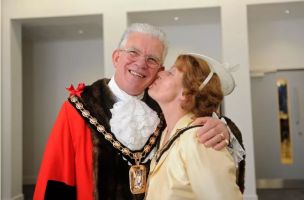
Picture courtesy of The News, Portsmouth
TRIBUTES have been paid to a beloved husband, councillor and former mayor who ‘bent over backwards for his constituents’ – even after he was told he had just six months to live.
Gerald ‘Gerry’ Shimbart, 74, died in the care of the Rowans Hospice on Tuesday, February 19 after an 18-month battle with stomach cancer.
Dicky Waite (joined 1939)
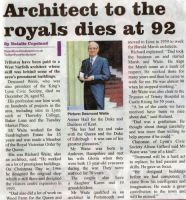
A tribute to Dicky Waite (joined 1939) from his wife, of 70 years, Gloria:
In 1943 Dicky went to Winchester College of Art to study to become an architect - inspired by a teacher who had spotted his ability in art classes. We kept in touch but in 1945 he was called up to join the Services. He chose the Royal Engineers and spent 15 months in Malaya - he always said he had actually enjoyed his army training and service.
We got engaged before he went abroad and on his return in 1948 we were married although he went back to College, this time in Portsmouth, to complete his qualification as an architect which took several years. He then obtained positions in the New Forest, Chippenham and Portsmouth.
We moved to King's Lynn in 1959 with our daughter Karen, aged ten and our son Richard aged six. Dicky was able to purchase a thriving practice when, after 6 months, his new boss died suddenly but he had little experience of dealing directly with clients or actually running an office. However, with his usual determination, desire and diligence which he applied to his own practice it became extremely successful eventually employing 3 secretaries and 5 assistants. Work came in for churches (at one time he had 50 to inspect and look after) and almshouses (about 40 to improve and renovate) all over Norfolk and Suffolk. And, being so close to Sandringham, he was asked to help with a problem on a farmhouse on the Estate. This led to work for Sandringham Estate for 35 years culminating in the design and construction of a new large Visitor Centre which included a 200-seater restaurant, a souvenir shop, tea room, flower and plant stall and ice cream counter. In the 1970s and 80s he worked on Anmer Hall for the Duke of Kent and for the Duke of Edinburgh on solar panels (when it was a recent invention) on staff quarters at the Queen's smaller private house.
He met the Queen, Prince Phillip and Prince Charles on many occasions, even taking tea with them in their private sitting room at the Palace, but he was always discreet about these meetings. As a result of all this work, in 1994 he received an MVO (Member of the Royal Victorian Order) which was presented to him at an investiture at the Palace for personal services to Sandringham Estate. During this time we went to Garden Parties at the Palace and three cocktail evenings at Sandringham House.
He was also sponsored by Sir Bernard Fielding to become a Fellow of the R.I.B.A for his contribution to architecture. In King's Lynn itself he worked on buildings of all kinds, always considering the heritage of the area. He belonged to the Round Table, 41 Club, Chamber of Trade, Business and Professional Men's Club, Conservative Area Advisory Panel, was a Committee Architect on the National Association of Almshouses and President of the King's Lynn Civic Society. All this kept him in the public eye and contributed to an extraordinary and productive life richly deserved due to his talent, imagination and work ethic. His last design, in his late eighties, won the Mayor's Award for Design in the Environment, a fitting last tribute to him.
His full name was "Desmond Kenneth" and "Dicky" evolved after a teacher noted his initials "D.K".
NB There is a further contribution from Gloria in the Evacuation Section reflecting on her (and Dicky's) days during the Second World War evacuation to Brockenhurst - see Evacuation
The following obituaries are all PDF files that can be viewed, printed and/or downloaded. Just click on any of the links to view in a new tab.
-
Douglas Arnold (joined 1932)
-
Derek Barnard (Joined 1966)
-
Mr W. L. Blake (French Master - joined in late 1950s)
-
Desmond Boswall (joined 1936)
-
George Butterworth (joined 1960)
-
Charles Cook (joined 1934)
-
Brian Gant (joined 1948)
-
Bill Hartfree (joined 1933)
-
Fritz Koerner (joined 1943)
-
Martin Laker (joined 1950)
